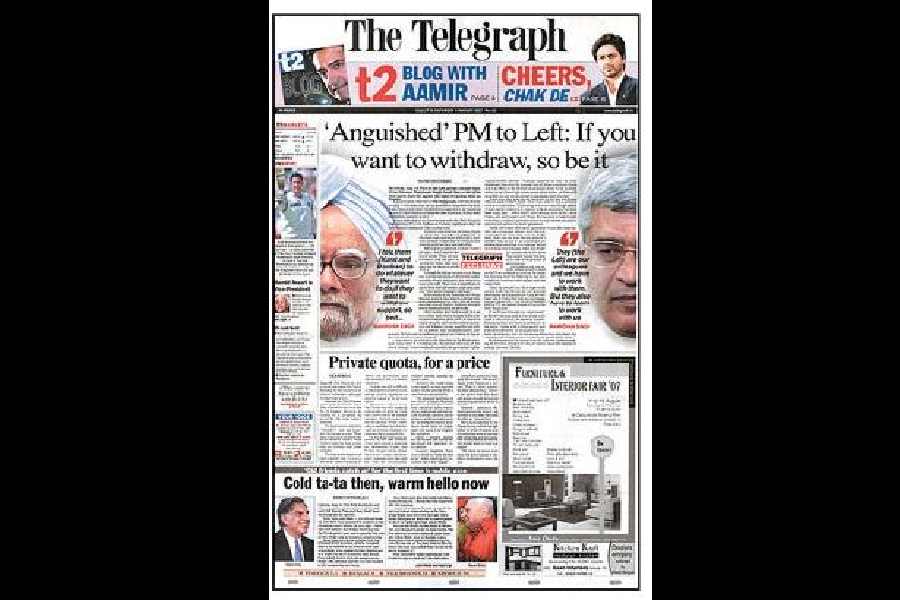Tired of the Left parties' constant bark, Prime Minister Manmohan Singh dared them to bite after their latest diatribe against the Indo-US nuclear deal on Tuesday (August 7, 2007).
In an exclusive interview with The Telegraph, the Prime Minister said: "I told them that it is not possible to renegotiate the deal. It is an honourable deal, the cabinet has approved it, we cannot go back on it. I told them to do whatever they want to do, if they want to withdraw support, so be it.." He was referring to his conversation with the CPM's Prakash Karat and the CPI's A.B. Bardhan on Tuesday night, hours after the Left released a statement on the nuclear deal.
In a frank conversation, the Prime Minister said he was "not angry but anguished" at the harsh tone and tenor of the Left's reaction and made it clear that the UPA-Left relationship could not be a one-sided affair. Replying to a question, he said: "I don't get angry, I don't want to use harsh words. They are our colleagues and we have to work with them. But they also have to learn to work with us."
Although he did not raise his voice, those last 10 words had a hint of steel, which underlined the Prime Minister's new resolve to take on the Left. There was no immediate response from the Left leaders, Singh said, adding: "They haven't thought it through." In the course of the interview, the Prime Minister made it clear that the Left had a flawed understanding not just of the 123 Agreement but also of India's intrinsic strength and its enhanced status in the world.
On the nuclear deal itself, he said: "It is an honourable deal which enlarges India's development options, particularly in regard to energy security and environmental protection, and it doesn't in any way affect our ability to pursue our nuclear weapons programme. We have not surrendered an iota of our freedom in this regard; not an iota of our sovereignty."
In this context, he referred to the interview in The Hindu newspaper with R. Chidambaram, the former chairman of the Atomic Energy Commission and currently the government's principal scientific adviser. "I cannot improve on what he (Chidambaram) has said. He has said that all three conditions have been met."
Asked why then was the Left objecting to the deal, the Prime Minister said: "I don't know. (But) they seem to have a problem with the United States." Elaborating on his own stand, Singh added: "I want India's relations to improve with all powers and we have been doing that -- with the US, with Russia, with the EU, with France, and particularly with China."
On the Left's fears that the 123 Agreement would draw India further into a strategic alliance with the US, rendering it an American satellite, Singh said: "How can we ever become anyone's satellite? Yes, we live in an increasingly interdependent world but the challenge before us is to forge new linkages, widen our strategic options and, at the same time, guard against the negative side of globalisation."
Although he did not directly attack the Left's stand on the US as outdated or alarmist, he made his meaning clear by referring to the way communist countries were dealing with the superpower China, he pointed out, had a huge trade surplus with the US but was not worried about losing its independence. "Look at Vietnam, look at China -- out of fear of dealing with the US, we cannot become a frog in the well," Singh said.
If the Prime Minister was "anguished" at the Left's obvious lack of trust in him to do right by the country, he appeared equally dismayed at their low levels of confidence in the nation. "India, with a billion people and with such a diversity of languages and cultures and religions, with its functioning democracy and respect for rule of law is a unique country; we are a role model for the world."
By railing against the nuclear deal, the Left was "underestimating the intrinsic strength of India, of India's capacity to defend its national interests," he felt.










